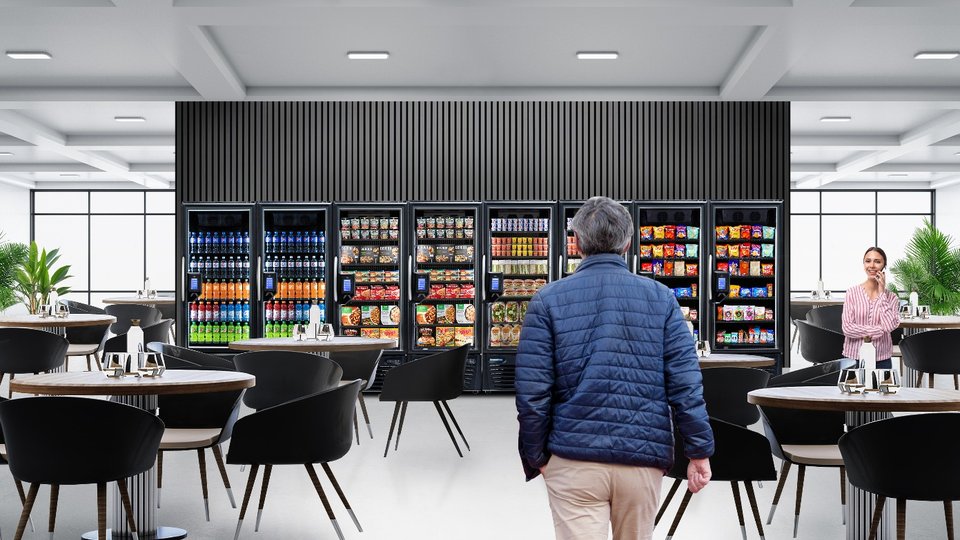Retail
Revolutionizing beverage retail in micro markets with smart systems, AI
The unmanned nature of micro markets positions them for remarkable success using smart systems and AI.

October 22, 2024 by Randy Skyba — Vice President of Sales and Marketing, Due North
Across many retail spaces, one of the most impactful technological developments is the automated check-out kiosk. This machine has alleviated retailers' staffing concerns while also effectively facilitating seamless check-out processes for customers. This innovation demonstrates the power of automation in retail, but it is merely a scratch on the surface when it comes to what technology can truly achieve. By leveraging newer and more advanced innovations, such as smart systems and Artificial Intelligence, retailers can expand their capabilities in many aspects of their operations, including inventory management, marketing and store planning.
Automated check-outs are a demonstration of unattended retail, which encompasses any form of retail that is completed without human supervision. Within unattended retail are micro markets, a subset that is rapidly growing in popularity. These spaces, compact albeit fully functional, are usually situated in densely populated areas such as office buildings, campuses and hospitals. These stores embrace customer independence completely as they eliminate human interaction entirely, not just in the checkout process, but in the whole shopping experience as well.
The unmanned nature of micro markets positions them for remarkable success using smart systems and AI. Beverage retail, in particular, can become a profitable revenue stream thanks to the substantial technological advancements in commercial refrigeration. With smart systems and AI, automation and efficiency extend beyond the checkout process; they are integrated throughout the entire shopping experience.
Relieving human labor
In convenience stores, the manual labor required to perform the various operational tasks places a lot of burden on staffing and training. This reliance on human resources means that operations can suffer due to underperforming or absent staff members. Smart systems and AI help alleviate this challenge, enabling faster, more efficient and more accurate in-store transactions. For instance, inventory management is a labor-intensive task that typically needs to be performed daily, often requiring Point-of-Sale count or a manual audit where staff check stock item by item. In beverage retail, this process is dramatically expedited through weight-based sensors that accurately determine the remaining items in the refrigerator based on their weight. What would usually take hours to complete is then done accurately and quickly, almost instantly.
Beer is a popular beverage in many convenience stores, highlighting the necessity for micro markets to offer these products. However, age verification traditionally relies on staff, which can be a challenging task. Fortunately, modern commercial refrigerators now feature smart lock systems that can conduct age verification directly within the unit. This system locks the refrigerator's contents and requires a valid ID to be scanned for access. This simple process not only eliminates the need for human verification but also reduces the potential for errors, bias or judgment in the age-checking process.
Ensuring customer safety and enhancing customer experience
In addition to facilitating age verification, smart locks are essential for preserving food safety and freshness. For sensitive food and beverage items that must be kept at very low temperatures to avoid spoilage, commercial refrigerators can automatically lock during power outages or temperature fluctuations, protecting product quality. This feature helps present consumers from inadvertently purchasing spoiled items. In micro markets, where products like packaged meals require consistent cold storage, this capability is particularly valuable. By ensuring that products remain fresh and safe, smart lock-equipped commercial refrigerators enhance a retailer's reputation and foster greater consumer trust.
Beyond consumer safety, modern commercial refrigerators can greatly enhance the customer experience through AI. For instance, AI can offer instant information and guidance to shoppers who may be uncertain about their choices. A digital screen on the refrigerator doors can interact with customers, providing personalized recommendations based on their preferences, needs and dietary requirements. This feature is especially valuable in micro markets, where shoppers often lack immediate access to assistance or staff to help with their selections.
Optimizes operations
In enhancing inventory management, modern commercial refrigerators play an essential role. With precise temperature control and advanced monitoring systems, these units enable businesses to maintain optimal storage conditions, minimizing the risk of product loss. Features such as digital displays, automated alerts and real-time data tracking allow operators to monitor inventory levels and storage environments closely, ensuring that perishable items are kept at the appropriate temperatures. This not only extends the shelf life of products but also streamlines the restocking process, helping businesses manage their inventory more efficiently and reduce waste.
Provides strategic insights
Smart systems and AI in modern commercial refrigeration are transforming the way micro markets and businesses manage inventory by offering strategic insights, enabling retailers to pivot and adjust to improve sales. AI-powered systems can monitor real-time inventory levels, sales trends and external factors like temperature and foot traffic, which can help inform decisions when it comes to pricing. With this data, businesses can adjust prices dynamically based on demand and supply. For example, AI can suggest price reductions on beverages nearing expiration or during off-peak hours to encourage sales, maximizing revenue and reducing waste. These intelligent systems not only automate pricing strategies but also provide valuable data-driven insights that help businesses optimize profitability and enhance customer engagement.
Additionally, real-time business analytics enable operators to forecast trends, adjust inventory levels and fine-tune pricing strategies to maximize profitability. This integration of AI, customer insights and analytics not only optimizes pricing but also drives smarter, data-informed business decisions.
Conclusion
The integration of smart systems and AI in micro markets is revolutionizing beverage retail by enhancing operational efficiency, improving inventory management and enriching the customer experience. Modern commercial refrigerators equipped with advanced technology streamline processes such as age verification and product monitoring, ensuring safety and quality while reducing reliance on staff. The ability to analyze real-time data allows retailers to adjust pricing dynamically and make informed decisions, maximizing profitability and minimizing waste. As micro markets continue to grow in popularity, these innovations position them for remarkable success, ultimately fostering greater consumer trust and engagement in a seamless self-service shopping environment.
 ChatGPT
ChatGPT Grok
Grok Perplexity
Perplexity Claude
Claude









